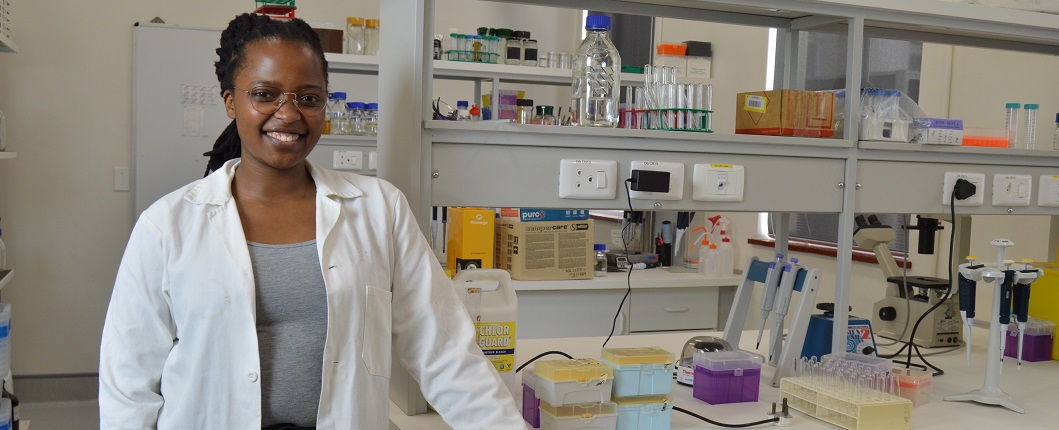Science
Chemistry and Polymer Science

The Department of Chemistry and Polymer Science offers a BSc Chemistry degree programme comprising three focal areas, of which you choose one:
The Chemistry and Polymer Science focal area combines all the mainstream modules with elective modules chosen from applied chemistry, applied mathematics, computer science, geology, microbiology, physics and mathematics. This allows for a major in Chemistry and/or another subject (depending on your electives).
The Chemical Biological focal area combines mainstream chemistry modules with biochemistry and microbiology. This allows for majors in Chemistry and Biochemistry.
The Applied and Sustainable Chemistry focal area combines the mainstream chemistry modules with applied chemistry modules, e.g. polymer science, medicinal chemistry, as well as green and sustainable chemistry.


empty
empty tag
What is Chemistry?
Chemistry is an overarching discipline with its primary focus on the study of matter. This involves an understanding of the composition, structure and properties of ALL matter. The entire universe is composed of matter and includes animate and inanimate material. The changes that matter undergoes is known as a chemical reaction.
What do chemists do?
Chemists study:
- The structure and properties of matter.
- How the components of matter are rearranged to form new matter with completely different properties
- Processes whereby molecules combine and react with each other and how fast these processes occur
How does chemistry relate to the other sciences?
Chemistry is regarded as the “central science” as many of the other scientific disciplines are dependent on chemistry. Qualified chemists require some degree of a working knowledge of several of the other scientific disciplines. Students following the chemistry programme, therefore must enroll for modules in mathematics and physics, with electives such biology or geo-environmental science. As chemists need to be computer literate, some compulsory modules in computer literacy are essential.
What are the different focal areas in the BSc Chemistry degree programme at Stellenbosch University?
The Department of Chemistry and Polymer Science offers a BSc Chemistry degree programme comprising three focal areas:
The Chemistry and Polymer Science focal area combines all the mainstream modules with elective modules in applied chemistry (including polymer science), physics, mathematics, geology, and applied mathematics. This allows for a major in Chemistry and another subject of your choosing.
The Chemical Biological focal area combines mainstream chemistry modules with biochemistry and microbiology. This allows for a major in Chemistry and Biochemistry.
The Applied and Sustainable Chemistry focal area combines the mainstream chemistry modules with applied chemistry modules, e.g. polymer science, medicinal chemistry and green chemistry.
What is the difference between Biochemistry and Chemical Biology?
In chemical biology, the emphasis is on the use of chemistry to understand biological problems. Essentially, in chemical biology we deal with the interaction of relatively small molecules with biological systems. Biochemistry on the other hand, is the study of chemical reactions within living systems. Most often these reactions involve large macromolecules such as DNA, proteins, enzymes etc.
What is the difference between Chemistry and Chemical Engineering?
Chemists tend to be concerned with studying fundamental chemical processes, which are normally conducted on lab-scale. Chemical Engineers on the other hand applies chemical knowledge to develop large-scale processes to produce chemicals and a range of materials. They design and operate large chemical plants to mass produce essential chemical products. A chemical engineer will use mathematical and physical concepts to operate and maintain large-scale reactors to produce large amounts of products. In designing new chemical processes, chemical engineers will collaborate closely with the chemists with the latter understanding the chemical reaction on a molecular level, while the engineer will use his / her knowledge to ensure that the production of the chemical product can be carried out optimally and safely.
Which postgraduate programmes can be followed after completing a BSc degree programme with any of the Chemistry streams?
Obtaining a BSc in Chemistry allows you to do a BScHons in Chemistry. The chemistry and polymer science department offers two Honours programmes: an Honours in Chemistry; or an Honours in Polymer Science. For both these programmes, the minimum entrance requirement is an average of 60 % in all four of the core models at third-year level, viz. Analytical, Physical, Organic and Inorganic Chemistry.
For advanced training, you can follow-up the Honours with an MSc and PhD degree. Many chemistry graduates with MSc and PhD degrees, who work in industry, have greater opportunities for career advancement and often end up in senior management or other upper echelons of the company.
What are the career opportunities for chemists?
Chemistry graduates are usually equipped with a variety of skills that are highly sought after in a wide range of sectors in a variety of different jobs.
Some jobs that can be done by chemistry graduates include:
- Analytical chemist
- Forensic scientist and toxicologist
- Mining technologist
- Metallurgist
- Pharmacologist
- Environmental consultant
- Water Treatment technologists
- Scientific writer for magazines and newspapers
For any of the Chemistry streams, which Mathematics module should I take in the first year?
It is advisable to do Mathematics 114, and not Mathematics (Bio), as the former is a prerequisite for 2nd and 3rd year Chemistry.
If I originally have no intention of studying for a degree in Chemistry (but are enrolled for another BSc within the Faculty of Science), and after the 1st year I realise that Chemistry is actually the field that I wish to follow, could I then continue with Chemistry in 2nd year?
There are many students who start 1st year BSc and are uncertain about the subject direction which they wish to follow, some of these have gone on to be leaders in Chemistry careers, having not started out wanting to study Chemistry. Here at Stellenbosch, your 1st year curriculum is structured in such a manner that you could then continue with Chemistry, even if Chemistry was not your original choice. First-year students’ experience with practicals, tutorials, the lecture content and their lecturers get them so excited about Chemistry that they wish to continue studying in this direction. You would thus have lost no time on condition that you have followed Mathematics 114 and 144, since that is a requirement. However, you have to make a formal request to change streams. The Science Faculty’s Academic Committee will then have to approve your request.
If I am a 1st year enrolled for a BSc Chemistry, but I am not yet sure which Chemistry stream I hope to follow, may I change to the one I wish to follow in 2nd year?
Yes, the 1st year is a general programme and essentially, in 2nd year you are following your chosen stream. However, you have to make a formal request to change streams. The Science Faculty’s Academic Committee will then have to approve your request.



